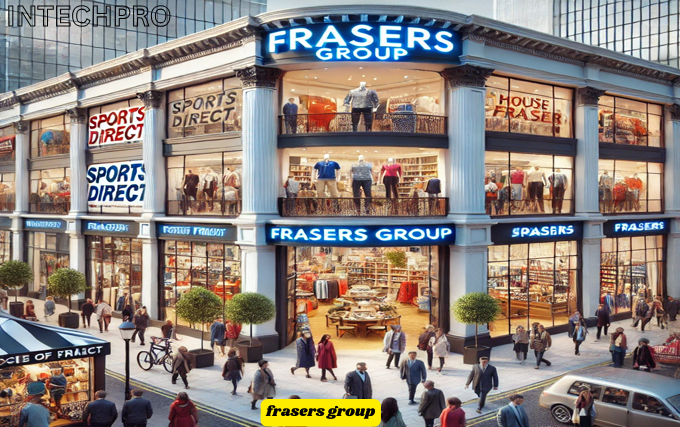Frasers Group, formerly known as Sports Direct International, is a British retail and intellectual property group with a diverse portfolio of brands. Under the leadership of Mike Ashley, the company has grown from a small chain of sports shops into a global powerhouse. This article delves into the history, business model, acquisitions, and future prospects of Frasers Group, offering a comprehensive overview of its operations.
The Genesis of Frasers Group
Humble Beginnings
Frasers Group’s story began in 1982 when Mike Ashley opened a single sports store in Maidenhead, England. Initially named Mike Ashley Sports, the business aimed to provide affordable sporting goods to local communities. The company’s early years were marked by steady growth, fueled by Ashley’s ambitious vision and keen business acumen.
Transformation into Sports Direct
In 1999, the company rebranded as Sports Direct International. This period saw an aggressive expansion strategy, with Ashley acquiring several struggling sports retail chains across the UK. By leveraging economies of scale and negotiating favorable deals with suppliers, Sports Direct was able to offer competitive prices, attracting a large customer base. The company’s IPO in 2007 further fueled its expansion, providing the capital needed to acquire more businesses and invest in technology.
Diversification and Rebranding
Transition to Frasers Group
In 2019, Sports Direct underwent a significant transformation, rebranding itself as Frasers Group. This move was part of a broader strategy to diversify its portfolio and reposition itself as a leading global retailer. The new name, inspired by the high-end department store House of Fraser (acquired in 2018), signaled the company’s shift towards a more upscale market.
Expanding Brand Portfolio
Frasers Group’s diversification strategy involved acquiring a variety of brands across different sectors. Some notable acquisitions include:
- House of Fraser: Acquired in 2018, this department store chain brought a touch of luxury to the group’s portfolio.
- Evans Cycles: Purchased in 2018, this acquisition allowed Frasers Group to tap into the growing cycling market.
- Jack Wills: Acquired in 2019, this British fashion brand appealed to a younger, fashion-conscious demographic.
- Game Digital: The acquisition of this video game retailer in 2019 expanded the group’s reach into the gaming sector.
Business Model and Strategies
Vertical Integration
Frasers Group’s business model is characterized by vertical integration, allowing the company to control various stages of the supply chain. This approach not only reduces costs but also ensures consistent quality across its products. By owning brands, retail outlets, and distribution networks, Frasers Group can efficiently manage inventory and respond quickly to market trends.
Omni-Channel Retailing
Recognizing the importance of e-commerce, Frasers Group has invested heavily in developing a robust online presence. The company’s omni-channel strategy integrates its physical stores with digital platforms, providing customers with a seamless shopping experience. Whether shopping online or in-store, customers can enjoy a consistent brand experience, including flexible delivery options and hassle-free returns.
Cost Leadership
Frasers Group’s competitive pricing strategy has been a key driver of its success. By negotiating bulk purchases and maintaining tight control over costs, the company can offer products at lower prices than many competitors. This cost leadership approach has helped Frasers Group attract a broad customer base, particularly in price-sensitive markets.
Challenges and Controversies
Labor Practices
Frasers Group has faced criticism over its labor practices, particularly concerning working conditions in its warehouses. Reports of low wages, poor working conditions, and a high-pressure environment have tarnished the company’s reputation. In response, Frasers Group has implemented measures to improve workplace standards and ensure compliance with labor laws.
Leadership and Governance
Mike Ashley’s leadership style has also been a subject of controversy. Known for his hands-on approach and aggressive tactics, Ashley has faced criticism from shareholders and industry observers. His decision-making, particularly regarding acquisitions and corporate governance, has occasionally led to conflicts with stakeholders. However, under new leadership, the company is striving to improve transparency and governance practices.
Financial Performance
Revenue and Profitability
Despite the challenges, Frasers Group has consistently reported strong financial performance. The company’s revenue has grown steadily over the years, driven by strategic acquisitions and robust sales across its diverse portfolio. While profitability has fluctuated due to market conditions and investment in expansion, the group’s financial health remains strong.
Impact of COVID-19
The COVID-19 pandemic presented significant challenges for Frasers Group, as it did for many retailers. Store closures and disruptions in the supply chain affected sales and profitability. However, the company’s strong online presence and adaptability allowed it to weather the storm better than many competitors. Post-pandemic, Frasers Group has rebounded, with a renewed focus on expanding its digital capabilities and enhancing the customer experience.
Future Prospects
Strategic Acquisitions
Frasers Group’s growth strategy continues to revolve around strategic acquisitions. The company is always on the lookout for opportunities to acquire undervalued or struggling brands that can be revitalized under its management. This approach not only expands its market reach but also diversifies its revenue streams.
Digital Transformation
Investing in digital transformation is a key priority for Frasers Group. The company aims to enhance its online platforms, leveraging data analytics and artificial intelligence to personalize the customer experience. By integrating technology into every aspect of its operations, Frasers Group hopes to stay ahead of the competition and meet evolving consumer demands.
Sustainability Initiatives
As environmental concerns become increasingly important to consumers, Frasers Group is focusing on sustainability initiatives. The company is committed to reducing its carbon footprint, sourcing sustainable materials, and promoting ethical practices across its supply chain. By embracing sustainability, Frasers Group aims to attract eco-conscious consumers and align itself with global efforts to combat climate change.
Conclusion
Frasers Group’s journey from a single sports store to a global retail giant is a testament to its strategic vision and adaptability. Through aggressive expansion, strategic acquisitions, and a commitment to innovation, the company has built a diverse and resilient business. While challenges and controversies have marked its path, Frasers Group’s ability to evolve and respond to market dynamics ensures it remains a formidable player in the retail industry. Looking ahead, the company’s focus on digital transformation, sustainability, and strategic growth positions it well for continued success in an ever-changing retail landscape.


